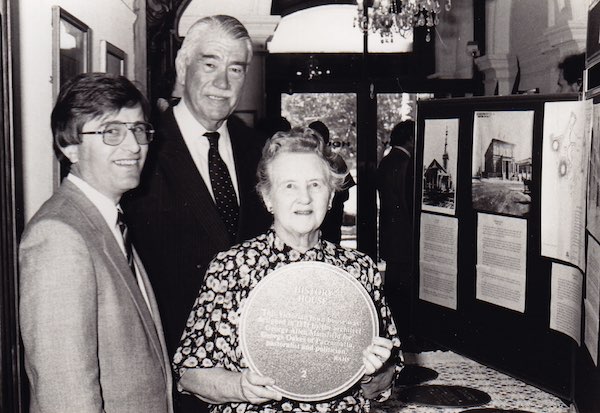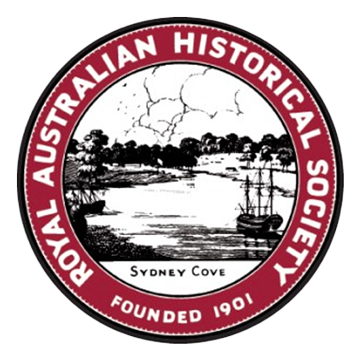Written by Melina Apostolidis, RAHS Volunteer
To celebrate Women’s History Month in 2024, the Royal Australian Historical Society will continue our work from previous years to highlight Australian women who have contributed to our history in various and meaningful ways. You can browse the women featured on our Women’s History Month webpage.
Alice Hazel King was an Australian historian and the first woman elected President of the Royal Australian Historical Society from 1982–1984. Her research on historical personalities and subjects contributed to a greater appreciation of Australia’s colonial history.
Born in 1908 in the Eastern Suburbs, Hazel came from a highly affluent family. She started her historical studies in earnest after her enrolment at Sydney University, graduating in 1953 with an honours degree in history. She then completed a masters in 1956, focusing on police organisation and administration in early NSW. After her mother died in 1956, she pursued further study abroad for a PhD at St Hugh’s College in Oxford. Her thesis was on Sir Richard Bourke, Governor of NSW from 1831 to 1837. It was revised and published in 1971 and ‘became the standard treatment’ on the subject.[1]

RAHS President Hazel King with Sir Roden Cutler, Chairman of State Bank of NSW, and RAHS General Secretary John Vaughan for the launch of the Green Plaques at History House on 11 April 1985.
Hazel’s academic interests reflected a nascent and growing interest in Australia’s history. As Anna Clark discusses in Making Australian History, there was a sort of ‘industrial revolution’ about the history of Australia around the sixties and Hazel was a part of this change.[2] It is also important to keep in mind that Hazel’s academic achievements happened at a time when it was rare for a woman to receive the extensive education she had. She was subsequently appointed a lecturer at the University of Sydney in 1960, where she taught early modern European history until her retirement in 1974.[3]
The growth of Australian national history was a slow evolution, and like this, Hazel was not a revolutionary figure, but rather one who had undertaken the task of laying the groundwork. As a research assistant at the Mitchell Library, under the supervision of Marjorie Jacobs, another RAHS member, Hazel had undertaken the classifying of new archival materials.[4] This experience helped her work on the Australian Dictionary of Biography, which included entries on Sir Richard Bourke and Eliza and Walter Hall (Eliza was her mother’s cousin and was recognised for the Walter and Eliza Hall Institute of Research in Pathology).
While she taught early modern European history over the course of her time at Sydney University, it was never her passion. Increasingly, she wrote about Australian history and the emerging personalities during the post-contact period. Elizabeth Macarthur was not originally considered as one of Australia’s leading figures and it was Hazel’s research that led to her being included in other studies.[5] Hazel’s interest in the role of women in history grew, which was also reflected in her other extracurricular activities, such as for Zonta, an organisation dedicated to promoting the fellowship of women in professional occupations. Following her study of Elizabeth Macarthur, she wrote about her half-sister, Olive, in One Woman at War. It was a collection of letters about her career as a hastily organised ambulance driver who worked with the Serbian army as the First World War broke.[6]
Hazel’s academic work came alongside her extensive volunteering effort, mirroring her parents’ civic-minded lifestyle. She joined the RAHS in 1954 while she was still beginning her university studies, working as an office bearer, librarian, and vice president. In 1982, she became the first woman to be elected RAHS President.[7] Hazel was a steadying figure for the RAHS at a time when memberships had been low, and the idea of selling History House had been in the minds of some. As Editor of the Journal of the Royal Australian Historical Society between 1964 and 1991, her academic training helped maintain the journal’s scholarly standards. She also contributed many articles to the journal.[8]
Hazel was certainly one of many historians who helped develop our understanding of Australia’s history. Thanks to her hard work, we can better understand Australia’s story. Hazel’s career reminds us that developing a revolutionary idea is much more difficult when there is no groundwork to base it on. Her research provided a foundation to build more nuanced accounts of Australia’s colonial past.
References:
[1] B.H. Fletcher, ‘King, Alice Hazel (1908–1997)’, Australian Dictionary of Biography, National Centre of Biography, Australian National University, https://adb.anu.edu.au/biography/king-alice-hazel-27067/text34541, published online 2021, accessed online 20 March 2024.
[2] Anna Clark, Making Australian History, Penguin Random House, 2022, p. 157.
[3] B.H. Fletcher, ‘Eulogy for Dr Hazel King’, History magazine, no. 55, 1998, p. 3.
[4] K.J. Cable, ‘Alice Hazel Kelso King, 1908–1997: An Obituary’, Journal of the Royal Australian Historical Society (JRAHS), Vol. 84, Part 1, June 1998; Fletcher, ‘King, Alice Hazel’.
[5] A.H. King, Elizabeth Macarthur and her World, Sydney University Press, 1971.
[6] A.H. King, One Woman at War: The Letters of Olive King, 1915–1920, Melbourne University Press, 1989.
[7] A. Whittaker, ‘Biographical Notes on the Fellows of the RAHS’, in Much Writing, Many Opinions: The Making of the Royal Australian Historical Society 1901–2001, JRAHS, Vol. 87, Part 1, June 2001, p. 77.
[8] Cable, ‘Alice Hazel Kelso King’.

0 Comments